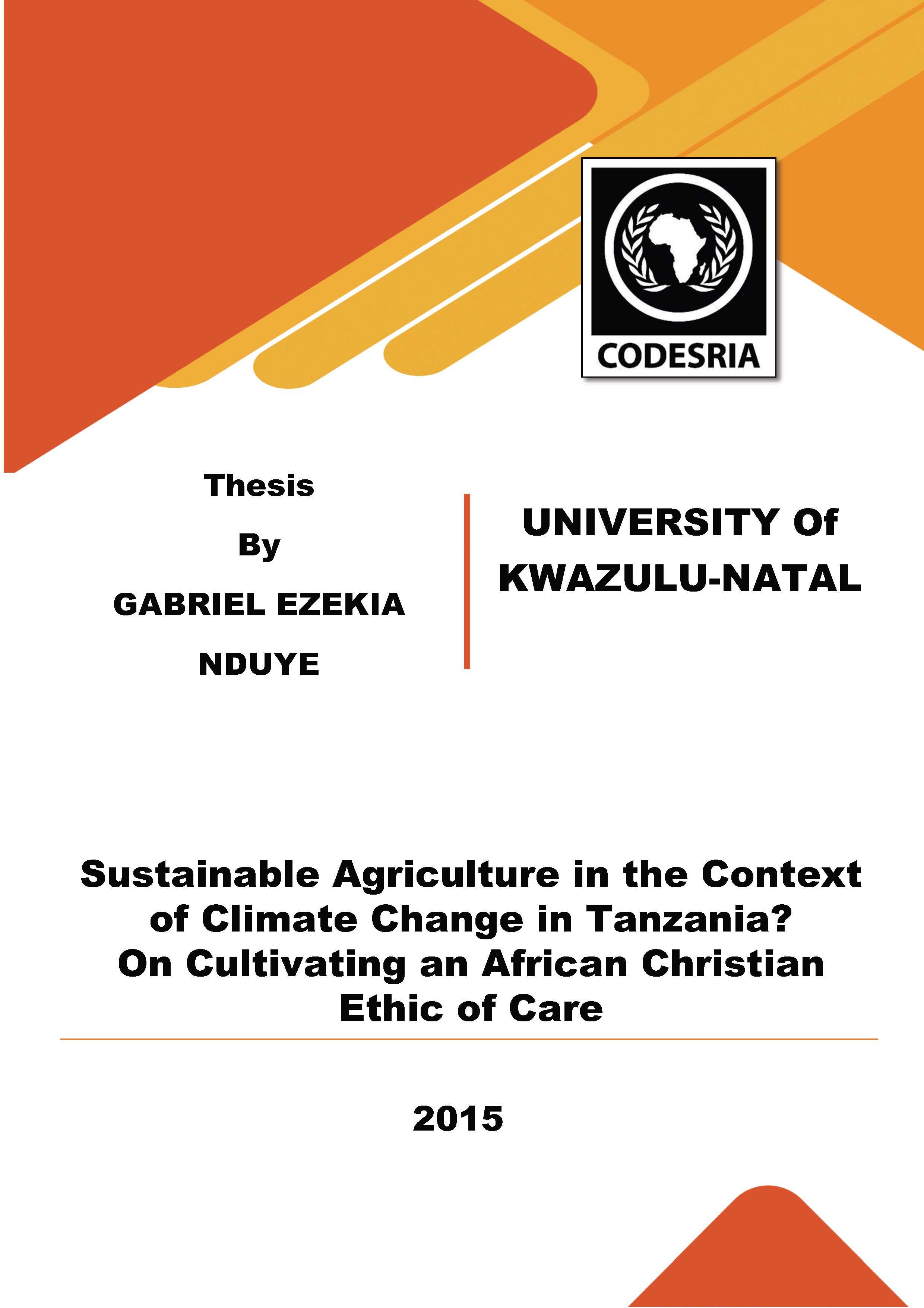Sustainable Agriculture in the Context of Climate Change in Tanzania? On Cultivating an African Christian Ethic of Care
Mots-clés :
Sustainable, Agriculture, Climate Change, TanzaniaSynopsis
Climate change, in relation to the world of agriculture, has harmed and continues to . harm all forms of life on earth. This study is an attempt to explore ways through which an African Christian ethic of care can be cultivated to promote sustainable agriculture in the context of climate change in Tanzania. Using theories of ecological transformation and of responsibility, also based on qualitative approaches to inquiry, the study argues that, because the agricultural sector is both a contributor to, and a victim of, climate change, a comprehensive African Christian ethic of care can make a significant contribution towards addressing challenges of climate change and environmental degradation today.
In general this study has noted that irresponsible modern agricultural methods, coupled with a mechanistic and anthropocentric worldview, have considerably contributed to the current climatic variability. Furthermore, Christianity through its anthropocentric theological position has for many years nurtured an unsustainable relationship between human beings and God's created order. Due to Christianity's anthropocentric theological viewpoint, humankind has been placed above all other forms of life on earth, based also on the claim that the human being is God's image-bearer. This has been compounded by
the perceived superiority of Western philosophy and Western scientific knowledge which has downplayed African philosophy that, on the basis of indigenous ecological knowledge, embraces some important life-affirming agricultural methods. In this regard, the study has appealed for the need for an African Christian agro-moral vision rooted in African wisdom that will enhance sustainable agriculture in the context of climate change in Tanzania.
It has been further noted in this study that the African concepts of Ubuntu and Ujamaa, as advocated by Mwalimu [teacher] Nyerere [the first President of the United Republic of Tanzania], contain ecological wisdom which can be harnessed in order to cultivate an African Christian ethic of care to promote truly life-affirming agricultural methods, as opposed to the irresponsible modern farming practices that have been detrimental to God's creation and that have depleted ecosystems which support life on earth. However, the study argues that the successful cultivation of an African Christian ethic of care for sustainable agriculture needs to be informed by three key factors. Firstly, climate change and agriculture must be treated as a matter of faith, calling for traditional Christian faith formation to be revisited. Secondly, climate change and agriculture must be seen as a
matter of Christian mission, hence mission and pastoral formation process has to be critically reviewed. Thirdly, climate change and agriculture shou.ld be seen as a Christian moral-theological issue which requires a reassessment of the current Christian moral formation process. The fulfilment of these factors can potentially lead to the formation of an earth-caring community.
Therefore, the study has proposed that the traditional model of Christian formation, whose objective is to impart doctrines, traditions and other worldly perspectives must be reinstated with an ecological Christian formation perspective. The purpose of ecological Christian formation must be threefold: to strengthen a responsible Christian faith, to enhance Christian responsible life and to consolidate a holistic Christian mission. This new formation process has the potential of leading to the building of an earth-caring community that recognizes faith, doctrines and traditions as fundamentals for lifeenhancing agriculture and for Christian ·life in general. On the basis of faith, doctrines and traditions, faith communities can potentially be able to define the condition of their natural environment, to identify principles for change and to set up strategies for a transformation that seeks to enhance all forms of life on earth.
Téléchargements
Références
Stavridis,.Glenn: 2009. "Environmental ethics for the earth." In Louise Kretzschmar, Wessel Bentley and Andrew Van Niekerk (eds). What is good life: An introduction to Christian Ethics in 21'' centtfry Africa. Panorama Parow: AcadSA Publishing. pp 244-262. pp 1-10.
Stead, Michael R. 2010. "To 'rule over' and 'subdue the creation. Saint Mark's review 212 (2)" http://www.anglican.org/au.docs/commissions. pp 13-24. Accessed 23 October 2012.
Stiftung, Henrich Boll. 2010. "Climate change vulnerability and adaptation preparedness in Tanzania." Nairobi: LTS Africa.
Stumme, John R. 1998. "A tradition of Christian ethics." In Karen L. Bloomquist and John R. Stumme (eds). The promise of Lutheran Ethics. Minneapolis: Fortress Press.
Swai, Bonaventura. 1980. "Crisis in colonial agriculture: Soil erosion in Tanganyika during the interwar period." http:/ /www.erosion.org. Accessed 02 June 2013
Tan, Yak-hwee. 2010. "Christ, Creation and Community: Biblical witness and praxis." In Claudia Wahrisch-Oblau and Fidon Mwombeki (eds) Mission continues: Global impulse for the 21'' centmy. Regnum: Edinburgh series. pp 124-134.






